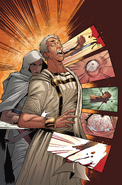The assassination of Julius Caesar was the result of a conspiracy done with many Roman senators who also happened to be members of the Roman branch of the Hidden Ones, a precursor group to the Assassin Brotherhood. They stabbed Caesar to death in the Curia within the Theatre of Pompey on March 15, 44 BCE.
Before his assassination, Caesar was the dictator of the Roman Republic, having recently been declared dictator perpetuo by the Senate of the Roman Republic. This declaration made several senators fear that Caesar wanted to overthrow the Senate in favor of tyranny. The conspirators were unable to restore the Roman Republic, and the ramifications of the assassination led to the Liberators' civil war and ultimately to the Principate period of the Roman Empire.
Meanwhile, the Order of the Ancients had also secretly supported Caesar. This attracted the attention of several Hidden Ones, most notably Aya, Marcus Junius Brutus and Gaius Cassius Longinus. Together, they secretly recruited the senators, at least forty of which were members of the Senates and secretly chose to eliminate Caesar for the good of the people.
The Assassination
Plotting the Assassination
In 44 BCE, after Caesar had declared himself dictator-for-life, the Hidden Ones met in a vault hidden beneath a Temple of Juno, in the heart of the city. Cassius tasked Brutus with creating the plan for the assassination, and each time the Assassins met in the temple, the conspiracy took shape.[1]
Brutus ultimately chose to attack Caesar when he entered the Senate on the Ides of March, a date that had been presented to Brutus through the strange visions he received while in the temple. In the Senate, Caesar would be alone, without the help of the inner circle and vulnerable to attack. The Assassins chose to act as a group, ensuring that each of the conspirators was devoted to the task.[1]
Defeating Septimius and assassinating Caesar

Aya facing Lucius Septimius
That day, Caesar's wife attempted to convince him not to attend the Senate, delaying his arrival and leading the Assassins to fear that the plot had been found out. Brutus persisted nevertheless, waiting for Caesar at the Senate for Caesar's eventual arrival. Lucius Septimius stated to Julius Caesar that the Roman people loved him and saw him as their God. Caesar expressed his doubts that the Senate would not be convinced to join him so easily, to which Septimius issues him that they just might. Aya instructed Brutus and Longinus to await for her signal to kill Caesar before engaging Lucius Septimius in battle. The two fought fiercely and Septimius was slain by Aya.[1][2]
Aya stabbing Caesar
When Aya snuck into the Senate, she stabbed Caesar from behind, giving the signal for the other conspirators to attack him. Although Caesar resisted at first, he soon recognized his former friend and colleague Brutus amongst the crowd and feeling betrayed and heartbroken, resigned himself to his fate, with Brutus delivering the final killing blow. Caesar was stabbed twenty-three times by the Assassins and died on the Senate floor as the attackers left the building.[1][2]
Aftermath
After the assassination, the Senate passed an amnesty on Caesar's assassins, which was proposed by Caesar's friend and co-consul Marcus Antonius. Nonetheless, uproar among the population forced Brutus and Cassius to flee the city, and the republic soon erupted into a series of civil wars.[1]
Eventually, armies under the command of Caesar's allies clashed with those of Brutus and Cassius at the Battle of Philippi in Macedonia. Faced with certain defeat, the two Assassins fled once more and committed suicide. In the following years, Caesar's grandnephew Augustus took the throne and founded the Roman Empire in 27 BCE.[1]
Trivia
- In the French version of Assassin's Creed: Origins, the last words of Caesar are the famous sentence Tu quoque mi fili, even if in the original version of the game he doesn't use the Latin version of the phrase.
Gallery
Appearances
- Assassin's Creed: Brotherhood (mentioned only)
- Assassin's Creed: Origins (first appearance)
- Assassin's Creed: Origins (comic)
References
| ||||||||||||||||||||||||||||||||||||||||
| |||||||||||||||||||||||||

